Reviewed by Glenn Erickson
We now hear plenty of praise for director Robert Altman, but his name once guaranteed arguments among film fans. Many worshipped him without qualification, while naysayers were offended that he could make bomb after box office bomb without losing his career (hear that, Bob Birchard?). I personally don't care for some of Altman's panoramic ensemble pictures yet really enjoy a couple of his spacier efforts. He was possibly at his best with a string of genre adaptations. By the 1970s several of the standard Hollywood genres had collapsed on themselves, and I found plenty of interest in Altman's revisionist western McCabe and Mrs. Miller and his gangster tragedy Thieves Like Us.
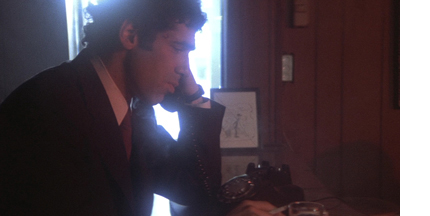
That doesn't mean that the public agreed. The Long Goodbye was fumbled by its distributor United Artists, dissed by reviewers and largely ignored when it came out in 1973. At that time, classically oriented detective movies had been replaced more or less by action films and the beginning of the kung-fu craze. The term film noir was not yet a standard phrase, not even in film schools. The romantic revival begun by Chinatown was still a few seasons away. James Garner's revival attempt Marlowe had not fared well. Who has strong memories of nostalgic efforts like Pulp, or Gumshoe?
Meet Marlowe, mellow mumbler.
Robert Altman's detective update is now lauded for its breezy style, good acting, and willingness to reconsider the literary basis of Raymond Chandler's Philip Marlowe character. Those looking for the next-generation Humphrey Bogart were surely put off by Elliott Gould's mellow mumbler, but now he's become a counterculture icon, as fixed and unique as A.I. Bezzerides' revisionist take on Mike Hammer in Kiss Me Deadly.
Laid-back detective Philip Marlowe (Elliott Gould) helps his best friend Terry Lennox (Jim Bouton) flee to Mexico, only to be hounded by the police when Terry is accused of murdering his wife Sylvia. It soon comes out that Lennox committed suicide in Mexico. Marlowe refuses to believe that either report without proof. The notoriety from the incident lands Marlowe a missing persons job from Eileen Wade (Nina Van Pallandt), who wants Philip to retrieve her alcoholic husband Roger (Sterling Hayden) from his hiding place in a sanitarium. Philip discovers that the two cases overlap: not only did the Wades know the Lennoxes, local gangster Marty Augustine (Mark Rydell) had money dealings with both. Worse, the psychotic Augustine expects Philip to retrieve a huge sum of money Terry is supposed to have run off with. In addition to keeping Eileen and Roger clear of Terry Lennox's crime, Marlowe has to think about saving his own skin from the unpredictably violent Augustine.
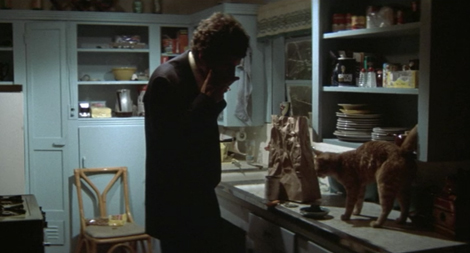
Time has been kind to The Long Goodbye, and if you haven't caught up with it until now, it's going to be a pleasant surprise. Altman and writer Leigh Brackett (screenwriter of the '46 Hawks The Big Sleep) do indeed monkey with the detective format. Elliott Gould's Marlowe is an anachronism, a '40s private dick out of step with the L.A. of the Nixon years. He drives an oversized 1948 Lincoln and is overwhelmed by the complexities of the modern world, with its Zen-nudist lesbian neighbors and its Courry Cat Food. The laid-back vibe is established in Marlowe's first 'adventure', an extended scene where he must decamp to the supermarket at 2am because he's out of cat food and his cat won't accept substitutes. How resourceful can Marlowe be, if he can't even con a cat?
But Gould's Marlowe is the same hero hiding behind a veneer of disinterest, a frequently humiliated white knight who maintains his dignity through a personal honor system. We can't help comparing Gould to the strutting, egotistical, slightly arrogant Bogey version, which is also only partly faithful to Chandler.
That's okay with me.
Altman's 'new' Marlowe only pretends to be unconcerned by the corrupt world around him. Just like the old model, he keeps his personal honor hidden while suffering the more demeaning demands of his profession. Much is made of Marlowe's refrain, "That's okay with me", when it's clear that many things get under his skin. He has no problem with the exhibitionist girls next door, but doesn't pretend to understand them. He has no patience for the cops and the hoods that constantly harass and threaten him. The police cynically pretend that he assaulted them, as a pretext for hauling him downtown for three days. Marty Augustine shows his power by playing games with his colorful gang of thugs ("I can't take my shirt off, Marty, not with all these scars!") before instructing them to beat Marlowe up. The detective is deceptively passive with both camps. But when it comes time to solve a crime or prove the innocence of a dear friend, our hero gets up on his hind legs and tells off the whole world. Being drunk helps, admittedly.
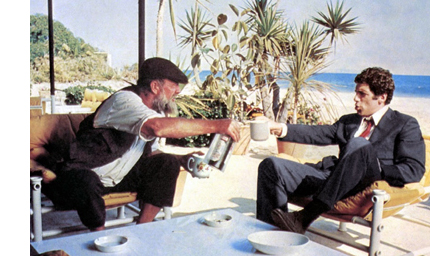
Naturally, the two unrelated cases in The Long Goodbye collapse into one, leaving some questions answered and others not. The utter unlikelihood of Sylvia Lennox's murder works in favor of the guilty, as neither the cops nor the crooks can deal with the kind of complexity that Marlowe knows every murder entails. That's not saying that he has a Sherlock Holmes handle on the situation. In this case Marlowe extends his sincere help and concern to a number of people. Most betray him with a casual selfishness that definitely is Not Okay by Him.
(Class-A spoiler warning)
Robert Altman must have known that his new ending would anger the Raymond Chandler faithful. I've read The Long Goodbye but all that I recall about Chandler's original climax is Marlowe's kiss-off lament that one can never say goodbye to the cops. When Altman's Marlowe catches up with Terry Lennox, he shoots him down in cold blood. It's the surprise of the film, and, for viewers that think the director an undisciplined hack, also its worst moment. But this new Philip Marlowe has limits, and Lennox's betrayal crosses the line. Altman and Brackett are saying that honor and loyalty are nostalgic sentiments, as out of fashion as the song 'Hooray for Hollywood. Perhaps Altman read the mood of the times, and decided that a contemporary Marlowe would just say the hell with it and act like Dirty Harry. 1
After Elliott Gould's big career kickoff in M*A*S*H, his star faded in a series of limp comedies and opaque experiments like Little Murders. He has said that his career was going nowhere when Robert Altman became excited about starring him in this Chandler story. Initial reviews wrongly reported that Gould was skating through this film as well, letting his personal brand of laid-back coolness do all the work. One has to admit that this Philip Marlowe is unique, a guy who hasn't got a girl and can't even properly keep a cat.
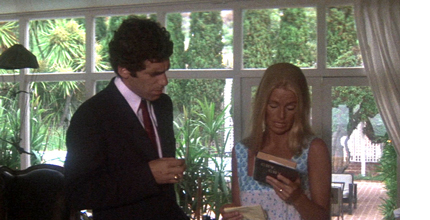
There are other fine performances to enjoy in The Long Goodbye. Nina Van Pallandt is luminous as Eileen Wade, the Malibu earth mother who cooks a mean chicken. Sterling Hayden's boisterous, bearish author on the brink of collapse is a very different kind of character; Altman originally meant it for actor Dan Blocker. The physically imposing Hayden is convincingly bullied by the tiny, insufferable Dr. Verringer (Henry Gibson, an Altman regular that I still find barely adequate) and thus provides Marlowe with his most telling clue. Mark Rydell's gangster resembles a Sunset Boulevard promoter who might be managing rock stars or sporting events. His constant agitation makes us think he's on cocaine, and his casual sadism creates one of the more horrible moments in '70s films. There's no missing a young Arnold Schwarzenegger as a crab-torso'ed muscle thug who can't wait to strip off his shirt and pants. Carl Gottlieb is a party guest, Enrique Lucero a Mexican policeman and David Carradine has a one-scene cameo as a jailbird philosopher.
The Long Goodbye may be the best of a group of pictures that seek to capture the L.A. vibe. Welcome to L.A. by Altman's protégé Allan Rudolph is so ridiculously mellow that the characters seem to sag and droop. Altman's gated-community Malibu is more detailed than the beach front apartment in Arthur Penn's moody Night Moves -- the only way that guy could be living on such choice real estate is if he's house-sitting. 2
In one scene, Elliott Gould chases Nina Van Pallandt's Mercedes on foot through Westwood in the middle of the night. He runs right by the drugstore where Savant turned in all of his UCLA student film for processing. It's the old Westwood, all right. In 1972 and '73 I was working a half-block away at the then-new, now demolished National Theater, so I prefer to believe that I was closing down the concession stand while that scene was being filmed.
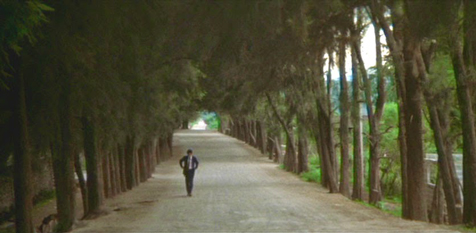
The KL Studio Classics Blu-ray of The Long Goodbye is a transfer identical to the Arrow Region B version released last year in the U.K., but with different extras. 3 Vilmos Zsigmond's cinematography captures an easy-going look, mostly in natural light and unconcerned about heavy backlighting or low light levels... an anti-Hollywood style that attracted new-generation directors like Brian De Palma and Steven Spielberg. The lazy zooms are also appropriate to the film's subject matter, as who in Malibu makes the extra effort? Altman/Zsigmond's visual games with reflections through the window of the Wades' beach house tie the location together. They also comment on Marlowe's 'there but not there' relationship to Eileen and Roger's complicated problems.
Altman was deep into audio textures at this time, mixing John Williams' score with old radio tunes. Williams' and Johnny Mercer's title tune is heard in no fewer than six different treatments with four different vocals. One cover is played by a rural Mexican band.

Kino has kept the extras from the old MGM DVD from 2002 (full list just below). The Altman/Gould interviews play as if both men were tapped on perfect days. Gould is candidly honest about himself, and Altman is blunt about what his picture accomplished. Another short subject concentrates on Vilmos Zsigmond's photographic technique, which is further expounded in a reprinted American Cinematographer article. All those deep-focus night shots required some risky procedures.
On a scale of Excellent, Good, Fair, and Poor,
The Long Goodbye rates:
Movie: Excellent
Video: Excellent
Sound: Excellent
Supplements: Docu Rip Van Marlowe, Vilmos Zsigmond on flashing the film, Reprinted American Cinematographer article, Radio Spots, Trailer
Deaf and Hearing Impaired Friendly?
YES; Subtitles: English
Packaging: Keep case
Reviewed: November 20, 2014
Footnotes:
1. Don Siegel's film makes an excellent comparison. Both heroes converge on a vigilante finale, but from opposite ends of the political spectrum. Harry Callahan is in Revenge Mode from the start; I don't think he makes a single arrest. At the end of The Long Goodbye Marlowe just chucks it all. Try to be noble, like someone out of a movie? Forget it, Philip, it's Chinatown. Hooray for Hollywood.
Return

2. Marlowe's own bungalow apartment is a real location off a street called Camrose, just South of the Hollywood Bowl. The bungalows themselves are on the crest of a hill, and just as in the movie are accessed via an elevator. It descends to a cul-de-sac lined with garages scaled to automobiles of the 1930s. A car as big as Marlowe's wouldn't be practical to park in the tiny street below, which is much narrower than it appears in photos. Although the property is now locked off and secure, around 1979 fellow editor Steve Nielson and I took the elevator to the top and walked around in search of a grassy view of the Hollywood Bowl similar to the one in Double Indemnity. I remember wondering how the residents moved their furniture up there or how a fire truck could get emergency access.
Return
3. The U.K.'s Arrow films released its own Region B The Long Goodbye Blu-ray over a year ago. I wanted to review it but my all-region player was malfunctioning. The disc's extras might interest U.K. collectors:
Isolated music score; featurettes RIP Van Marlow, with Robert Altman and Elliot Gould (24:35) (Repeated); Robert Altman: Giggle and Give In (56:32). Interviews: Elliot Gould (53:05); Vilmos Zsigmond (14:23) (Repeated); David Thompson (21:04); Tom Williams on Raymond Chandler (14:29); Maxim Jakubowski on Hard Boiled Fiction (14:33). Radio Spots (3:24) (Repeated).
Return
4. Reader Responses:
Paul Baack, 12.02.14:
Hey Glenn -- Loved your review of the The Long Goodbye Blu-ray! It's one of my favorite films from the 1970s, and I can't wait to get my hands on the blu.
Here's an interesting side note, although I don't know for sure if it's apocryphal or not: When The Big Lebowski was going into production, Joel & Ethan Coen screened the Altman movie for their cast and crew. Apparently, they thought it was the best example of the vibe they were going for. I think they succeeded; the two films are like cousins to each other (certainly, Lebowski's cast of characters could've stepped right out of a Raymond Chandler novel!). I think it's really interesting that a cult movie of the '70s could inform a cult movie in the 1990s, but then again, the cult of The Long Goodbye spreads far and wide.
As always, kudos for your great work on the site, one of the most entertaining and informed movie websites out there. Best wishes to you and yours for a happy holiday season! Regards, Paul Baack
Mike Hernandez, 12.02.14:
Glenn, Thanks for the heads-up review of The Long Goodbye on blu-ray. That's one I absolutely need to get. And good timing on the review, too. It appears that Marlowe's apartment is available. I don't think the cat comes with it, though. -- Mike
(Here's the text from the ad before it is taken down:)
"$2800 / 1br - Unique opportunity: Historic Hollywood Hills Apt (Hollywood Hills).
1BR / 1Ba apartment available now
w/d in unit detached garage
At the end of a cul de sac near the Hollywood Bowl, park your car in a garage carved into the hill. Walk through a gated tunnel to a private elevator where you'll be taken up 6 stories through the hill to the top of a Tuscan tower. Nestled in a quiet walk street enclave high above the bustle of Hollywood Blvd. 1bed, 1 bath includes the aforementioned private parking garage (remote door opener). Washer/Dryer, hardwood floors and terrace.
This is the apartment that Elliot Gould's character lived in in Robert Altman's The Long Goodbye. A movie worth seeing if you're not familiar with it. Here is a link to the brilliant intro where he tries to feed his cat (no joke):
Also featured in Kenneth Branagh's film Dead Again. Author Michael Connelly lived and wrote there. David Copperfield lived up there for several years in the 80's while performing at the near-by Magic Castle.
The location is great. Quiet, no freeway noise, beautiful views yet a short walk to Hollywood and Highland and the subway. And a shorter walk to the Hollywood Bowl."

Text © Copyright 2014 Glenn Erickson
See more exclusive reviews on the Savant Main Page.
Reviews on the Savant main site have additional credits information and are often updated and annotated with reader input and graphics.
T'was Ever Thus.
Return to Top of Page
|


